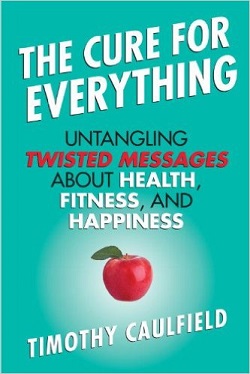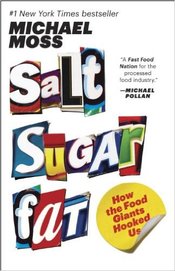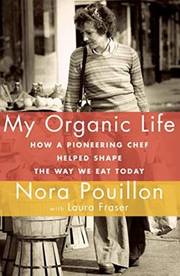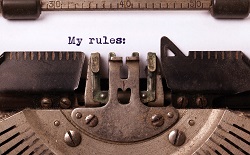 I write periodically about the dangers of sugar consumption and my own efforts to control if not banish this substance from my life. Right now I’m working on re-doing my recipes over on the hospitality blog, and for every dessert I’m including information on how many grams of sugar each serving contains. The typical amount is around 25 grams, or about 6 teaspoons, which, coincidentally, is the limit given by most researchers for the daily maximum we should have for added sugar.
I write periodically about the dangers of sugar consumption and my own efforts to control if not banish this substance from my life. Right now I’m working on re-doing my recipes over on the hospitality blog, and for every dessert I’m including information on how many grams of sugar each serving contains. The typical amount is around 25 grams, or about 6 teaspoons, which, coincidentally, is the limit given by most researchers for the daily maximum we should have for added sugar.
diet
The Low-Sugar Lifestyle–Rules of the Game
 I’ve written quite a bit about my periodic attempts to cut out sugar from my diet and have also posted reviews of several books about the dangers of sugar. The most recent material I posted was of an interview that Gretchen Rubin did with Gary Taubes, who has now written yet a third book on this dangerous aspect of the Western diet, The Case Against Sugar. I’m including the link again here; be advised that you have to give up your e-mail address in order to gain access to the PDF. It’s about 23 pages and very worthwhile reading.
I’ve written quite a bit about my periodic attempts to cut out sugar from my diet and have also posted reviews of several books about the dangers of sugar. The most recent material I posted was of an interview that Gretchen Rubin did with Gary Taubes, who has now written yet a third book on this dangerous aspect of the Western diet, The Case Against Sugar. I’m including the link again here; be advised that you have to give up your e-mail address in order to gain access to the PDF. It’s about 23 pages and very worthwhile reading.
Other than the annual chocolate tasting that my sister-in-law leads each year (well, this was the second year), a few sips of pink eggnog and some cookies,, mostly barely-sweet biscotti, I stayed off sweets for the holidays. Sometime in the next couple of weeks I’ll go in and get my A1C checked—a reading that gives a three-month average of your blood sugar load.
Build that Wall!

The Fragility of Good Habits

Common Sense Is the Key

The Cure for Everything: Untangling the Twisted Messages about Health, Fitness and Happiness by Timothy Caulfield, Beacon Press, 2012, available in several formats.
If you have time to read only one book on health this year, I would strongly suggest that it be this one. Were you to be prone to spend money on dietary supplements, cleanses, homeopathy, or acupuncture (to name a few currently popular fad items), you’d make back the money you spend on this book with all the money you’d save by cutting out your expenses on those totally needless items.
A dear friend from a number of years ago (and in a different state from where we live now) said to me about some nostrum or other, “It totally changes the way your body works.” Whoa! Do we actually want to do that? Sounds pretty dangerous to me. (She was safe in taking whatever-it-was, of course, as it did nothing of the kind. Cleaned out her wallet, but that’s about it.) Caulfield actually tries out every item he criticizes, so he puts his money where his mouth is. There’s a hilarious section
A Sobering Book that May Make You Happier
 Salt Sugar Fat: How the Food Giants Hooked Us by Michael Moss, Random House, 2013. Available through Amazon in several formats. See the author’s website for more information.
Salt Sugar Fat: How the Food Giants Hooked Us by Michael Moss, Random House, 2013. Available through Amazon in several formats. See the author’s website for more information.
One of the ways we can live a happier life is to live a healthier one. Bad health can be a constant drain, a chronic darkener of mood. Good health doesn’t necessarily make us happier, but it removes the drain. Does that make sense? Having good health is like having enough money: You’re freed to think about something else.
Readers of this blog will be seeing regular posts from now on about healthy eating. (It really should be “healthful eating,” but I just can’t bring myself to use that term. It sounds so pretentious.) I have cut out sweets from my diet pretty much completely, as I talked about in this post about personality types.
So What Am I Going to Eat?
 Well, I had a very spiritual book picked out for this week, and I definitely plan to write about it soon. But . . . have you heard the saying “When the student is ready, the teacher appears”? (I think that’s a koan, but I’m not sure.) So there I was at the library a few days ago, looking at the new books display at the top of the stairs as I always do, and here was this one. I love books about chefs. (Although I found Blood, Bones and Butter to be supremely put-down-able.) The organic part doesn’t interest me all that much, I’m not too sorry to say, but I was intrigued by the author because we used to live right outside Washington D.C. and I’d heard of her restaurant there. Not that we ever went–it’s pretty pricey. But I thought it might be fun to read at least some of it. Well, I was hooked right away. It says that she has a “with” author, so I guess Nora herself can’t take all the credit for the beautiful vivid writing, but it’s really a great read.
Well, I had a very spiritual book picked out for this week, and I definitely plan to write about it soon. But . . . have you heard the saying “When the student is ready, the teacher appears”? (I think that’s a koan, but I’m not sure.) So there I was at the library a few days ago, looking at the new books display at the top of the stairs as I always do, and here was this one. I love books about chefs. (Although I found Blood, Bones and Butter to be supremely put-down-able.) The organic part doesn’t interest me all that much, I’m not too sorry to say, but I was intrigued by the author because we used to live right outside Washington D.C. and I’d heard of her restaurant there. Not that we ever went–it’s pretty pricey. But I thought it might be fun to read at least some of it. Well, I was hooked right away. It says that she has a “with” author, so I guess Nora herself can’t take all the credit for the beautiful vivid writing, but it’s really a great read.
What’s Your Type?
 Here’s the list of (some of) my types:
Here’s the list of (some of) my types:
1. Obliger.
2. Abstainer.
3. Type 1.5 Diabetic. (Probable.)
I’ve discussed #1 a number of times, most recently in A Flash of Insight. . .
Do You Follow Your Own Rules?
 I write in chapter two of my book, “How Our Emotions Work” (see sidebar for ordering information), that one source of happiness/unhappiness is how well we keep our promises to ourselves. If we cave in and break a promise to someone else there are often consequences, but what happens when we don’t keep our word to ourselves? We are diminished in our own eyes. We feel bad. We berate ourselves: “Why did I do that?” Our blood sugar levels go up. Whatever.
I write in chapter two of my book, “How Our Emotions Work” (see sidebar for ordering information), that one source of happiness/unhappiness is how well we keep our promises to ourselves. If we cave in and break a promise to someone else there are often consequences, but what happens when we don’t keep our word to ourselves? We are diminished in our own eyes. We feel bad. We berate ourselves: “Why did I do that?” Our blood sugar levels go up. Whatever.
My Abstainer Tendencies Get Me into Trouble
 If you’ve been reading this blog for any length of time, you know that I’m a huge fan of Gretchen Rubin. I’ve read her three books on happiness and habits numerous times, and I hear my voice in my head as I do so. One of her key insights, especially relevant when it comes to healthy eating habits, is the divide between what she calls “moderators” and “abstainers.” (She and her sister have started doing a weekly podcast called “Happier with Gretchen Rubin,” and I was tickled that today’s episode includes a segment about whether or not to keep ice cream in the freezer which centers around this very divide.) I am mostly an abstainer, just like the listener who called in with the ice cream question, which means that I do better at controlling bad habits when I just abstain entirely, or almost entirely, from them. I do find it possible to eat just one chocolate truffle. And my little “eat only one dessert a week” mantra also works pretty well. BUT . . . if I overstep those bounds very much at all then I plunge into trouble. I can’t break the rules just a little bit; I break them a lot.
If you’ve been reading this blog for any length of time, you know that I’m a huge fan of Gretchen Rubin. I’ve read her three books on happiness and habits numerous times, and I hear my voice in my head as I do so. One of her key insights, especially relevant when it comes to healthy eating habits, is the divide between what she calls “moderators” and “abstainers.” (She and her sister have started doing a weekly podcast called “Happier with Gretchen Rubin,” and I was tickled that today’s episode includes a segment about whether or not to keep ice cream in the freezer which centers around this very divide.) I am mostly an abstainer, just like the listener who called in with the ice cream question, which means that I do better at controlling bad habits when I just abstain entirely, or almost entirely, from them. I do find it possible to eat just one chocolate truffle. And my little “eat only one dessert a week” mantra also works pretty well. BUT . . . if I overstep those bounds very much at all then I plunge into trouble. I can’t break the rules just a little bit; I break them a lot.